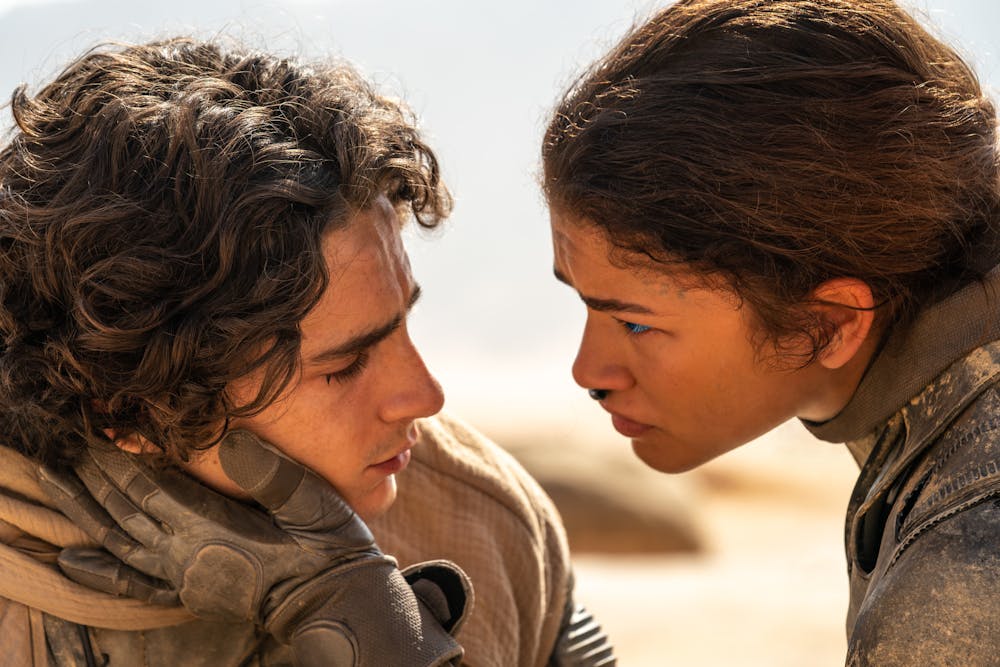I left my evening showing of “Dune: Part Two” and couldn’t stop geeking. The film was as close to perfect as any Dune adaptation could be — ripe for imminent rewatches and some amateur analysis I will lay out below.
A disclaimer: this review might contain some light spoilers from the first film and Frank Herbert’s book series the movie is based on.
The story follows Paul Atreides (Timothée Chalamet) as he regains his strength and seeks revenge after the trials of the first movie. He lost everything: his father, his wealth and the standing of his great house. Now, he wants revenge.
His mother, the lady Jessica, is part of a sisterhood order called the Bene Gesserit which crosses bloodlines across centuries and uses mental conditioning to create near-superhumans, including Paul. Paul has odd abilities; he sees visions of the future and can control people with his voice.
The order also spreads prophecy around the known universe. On the desert planet Arrakis the film is set on, the Bene Gesserit spread a story about a messianic figure called the “Lisan al Gaib,” meaning the voice from the outer world. As Paul begins to fill these messianic shoes for Arrakis’ native inhabitants and seeks revenge on those who wronged him, conflict ensues.
I am no expert on acting, but there were no complaints from me there. Chalamet’s performance is much improved from the first movie, Zendaya slays as per usual, Javier Bardem was hilarious as Stilgar (at least in the first part), and Rebecca Ferguson kills it as the lady Jessica. I hope Austin Butler didn’t method act as the psychotic villain Feyd-Rautha, who is insanely freaky but well-performed.
The technical aspects will speak for themselves upon watching and likely at the next Academy Awards. Standout shots for me included the Harkonnen planet Giedi Prime, everything with a worm and every single explosion. The soundtrack was outstanding.
After the first iteration of Dune, “Arrival” and “Blade Runner 2049,” director Denis Villeneuve cemented himself as a legend in sci-fi cinema. With countless attempts at filming Dune in the past (I didn’t like David Lynch’s, sorry), he was the right director at the right time and is setting himself up for success in the upcoming third film.
One thing many book readers will catch is what all of Villeneuve’s changes seem to point toward: a much more accessible Dune part three. While the first two movies follow the first book, the third movie will follow the second book, “Dune Messiah.”
“Dune Messiah” is weird as hell. Face shifters at the edge of what can be considered human, resurrection and even more intrigue than the first book scour its pages. We’ll see how much of that gets in the film, but Villeneuve is clearly priming the central plot for a more direct version of Messiah’s. I do hope he keeps at least some of the bizarreness of the book (and hopefully we will get to see a guild navigator in this one).
Another note on the weirdness of Dune — it is no reason to write the story off.
Look outside. Sure, we don’t have witch orders directing history through messianic prophecy. But think about how our world is shaped by the fact that nine countries have the power to drop the sun on any city at any time.
People clone their pets. Researchers created the hearts of stars in machines. I don’t need to belabor large language models and the march toward artificial general intelligence. Our world is odd too!
Only recently in our history have humans realized a depressing but liberating truth: we live on a speck of dust in an ancient galaxy in an unknowable universe. We can debate on whether anything we do matters, but this realization of scale should have humbled us.
The genius of the literary and cinematic Dune is that they embrace this strangeness of humanity’s predicament but scorn the universe’s attempts to humble us. They see the stars as just another setting for humanity to flourish, not a limit.
Some important book context I didn’t notice either movie mention is the reason for the lack of computers. Hundreds of years before the main story, humanity went to war with thinking machines (computers and AI) and ultimately prohibited their use. Humanity then turned to upgrading themselves through biological technology and the pseudo-magic of the Bene Gesserit.
This exposes the great curiosity and great savagery in humanity in the years to come. The story takes a cynical tone to this end, as humanity’s diverging civilizations across the stars exhibit both beauty and terror.
The distinct lack of feeling and sometimes personality in the film — as its characters succumb to religious fervor and politicking — is on purpose. Because more than anything, Dune is a story about the human heart at conflict with itself. It’s not a hero’s journey.
The story is one of the most pertinent epics to our time. The empire’s power structure is reminiscent of the late Roman Empire, rather than a democracy. There is no concept of “truth” in the film, as Paul must navigate believing either he is the messiah or that the whole prophecy is a mummer’s farce. There, again, are no computers. The sum is a reminder that none of our systems’ survivals are guaranteed.
Cynicism aside, the film left me hungry for more. While leaving the theater, I couldn’t help but wonder how people felt coming out of generational sci-fi and fantasy epics of the past. Did people leaving showings of “The Lord of the Rings: The Two Towers” in 2003 immediately understand the series' future cultural impact?
Every 20 years, a new sci-fi or fantasy epic seems to captivate nerds like me, between Star Wars, Lord of the Rings and potentially Dune.
It is not in my or anyone’s purview to decide this film’s legacy. But I believe we are witnessing something generational.






